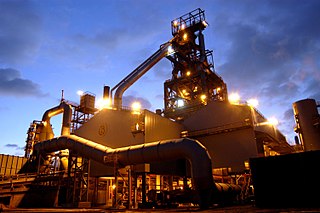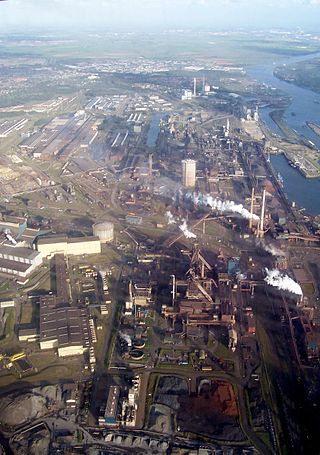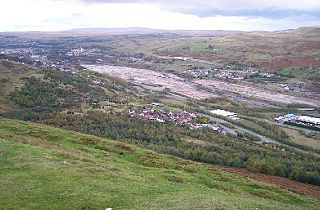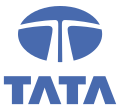
Steel Authority of India Limited (SAIL) is a central public sector undertaking based in New Delhi, India. It is under the ownership of the Ministry of Steel, Government of India with an annual turnover of INR 1,03,480 Crore for fiscal year 2021–22. Incorporated on 24 January 1973, SAIL has 59,350 employees. With an annual production of 16.30 million metric tons, It is the largest government owned steel producer. The hot metal production capacity of the company will further increase and is expected to reach a level of 50 million tonnes per annum by 2025.
Tata Steel Limited is an Indian multinational steel-making company, based in Jamshedpur, Jharkhand and headquartered in Mumbai, Maharashtra. It is a part of the Tata Group.

Tata Steel Europe Ltd. is a steelmaking company headquartered in London, England, with its main operations in the United Kingdom and the Netherlands. The company was created in 2007, when Tata Group took over the British-Dutch Corus Group.
Tinplate consists of sheets of steel coated with a thin layer of tin to impede rusting. Before the advent of cheap milled steel, the backing metal was wrought iron. While once more widely used, the primary use of tinplate now is the manufacture of tin cans.
ArcelorMittal South Africa is part of the steel company Arcelor-Mittal. The company was originally Iscor Ltd., a South African parastatal steel company. It was founded in 1928 and was first listed on the JSE Securities Exchange in 1989.

Tinning is the process of thinly coating sheets of wrought iron or steel with tin, and the resulting product is known as tinplate. The term is also widely used for the different process of coating a metal with solder before soldering.

Koninklijke Hoogovens known as Koninklijke Nederlandse Hoogovens en Staalfabrieken (KNHS) until 1996 or informally Hoogovens. was a Dutch steel producer founded in 1918. Since 2010, the plant is named Tata Steel IJmuiden.

Port Talbot Steelworks is an integrated steel production plant in Port Talbot, West Glamorgan, Wales, capable of producing nearly 5 million tonnes of steel slab per annum. This makes it the larger of the two major steel plants in the UK and one of the largest in Europe. Over 4,000 people work at the plant. The majority of the slab is rolled on-site at Port Talbot and at the Newport Llanwern site to make a variety of steel strip products. The remainder is processed at other Tata Steel plants or sold in slab form. The works covers a large area of land which dominates the east of the town. Its two blast furnaces and steel production plant buildings are major landmarks visible from both the M4 motorway and the South Wales Main Line when passing through the town.
IISCO Steel Plant of Steel Authority of India Limited is an integrated steel plant located at Burnpur, a neighbourhood in Asansol city, in the Asansol subdivision of Paschim Bardhaman district, West Bengal, India.

Salem District is one of the 38 districts of Tamil Nadu state in southern India. The district is now divided into Dharmapuri, Krishnagiri, Namakkal as individual districts. Salem is the district headquarters and other major towns in the district include Mettur, Thammampatti, Attur, Omalur, Sangagiri and Edappadi. That Salem dates to at least two thousand years ago is evident from the discovery of silver coins from the Roman Emperor Nero Claudius Caesar Augustus Germanicus found by Koneripatti of Salem in 1987. It was ruled by Mazhavar King Kolli Mazhavan and kings Adhiyaman and Valvil Ori of Sangam age. It is part of Mazhanadu, a vast region that dates to the second century BCE. Salem was the largest district of Tamil Nadu. It was bifurcated into Salem and Dharmapuri districts in 1965 and Namakkal district in 1997. Now Salem has been developed a lot by building many bridges and is considered to be the smart city. Salem is famous for cultivating mangoes.

Tata Chemicals Limited is an Indian global company with interests in chemicals, crop protection and specialty chemistry products headquartered in Mumbai, India. The company is one of the largest chemical companies in India with operations in India, Europe, North America and Africa. Tata Chemicals is a subsidiary of the Tata Group. Tata Chemicals has a publicly listed subsidiary called Rallis India.

Mobarakeh Steel Company is a private Iranian steel company, located 65 km south west of Esfahan, near the city of Mobarakeh, Esfahan Province, Iran. It is the largest steel maker of MENA region, and one of the largest industrial complexes operating in Iran. It was commissioned after the Iranian Revolution in 1979 and initiated operations during 1993. It underwent major revamping during year 2000, and is scheduled for a second and third revamping in 2009–2010, bringing the total steel output to 7,200,000 metric tons per year. The company owns the successful football club, Sepahan. In 2022, a parliamentary report indicated corruption of $3 billion, leading to the company being suspended from the Tehran stock exchange.
Tata Steel BSL Limited, formerly known as Bhushan Steel Limited, was the largest manufacturer of auto-grade steel in India. Tata Steel BSL Limited, with an amount of debt in proportion to its equity. The company's consolidated debt stands at ₹10,686 crore. The company was spending Rs. 260 billion to expand its capacity to 12 million tonnes annually, from the present installed capacity of around one million tonnes.

The Ravenscraig steelworks, operated by Colvilles and from 1967 by British Steel Corporation, consisted of an integrated iron and steel works and a hot strip steel mill. They were located in Motherwell, North Lanarkshire, Scotland.

JSW Ispat Steel Ltd (JISL) was set up as Nippon Denro Ispat Limited in May 1984 by founding chairman M. L. Mittal. The company has operations in iron, steel, mining, energy and infrastructure. It is listed on the Bombay Stock Exchange and National Stock Exchange of India. Ispat Industries was ranked 5th among major next to Tata steel and JSW steel companies in India for the year 2008 by Business World. It is headquartered in Mumbai and employs about 3,000 people.

Ebbw Vale Steelworks was an integrated steel mill located in Ebbw Vale, South Wales. Developed from 1790, by the late 1930s it had become the largest steel mill in Europe. It was nationalised after World War II. As the steel industry changed to bulk handling, iron and steel making was ceased in the 1970s, and the site was redeveloped as a specialised tinplate works. It was closed by Corus in 2002, but is being redeveloped in a joint partnership between Blaenau Gwent Council and the Welsh Government.

Rourkela Steel Plant (RSP), is a public sector, integrated steel plant in Rourkela, Odisha state, India. It was established on the 3rd of February 1959 with the help of West German industrial corporations on approximately 19,000 acres of land acquired from tribal inhabitants. The plant is operated by the Steel Authority of India (SAIL), a Central PSU.

Trostre Steelworks is a tinplate manufacturing facility located in Pemberton, Carmarthenshire, just outside Llanelli, West Wales. Planned by the Steel Company of Wales in 1947, today it is part of Tata Steel Europe's infrastructure.

Salem Steel Plant (SSP), a unit of Steel Authority of India Limited (SAIL), is a steel plant involved in the production of stainless steel. It is located along the Salem — Bangalore National Highway 44 in the foothills of Kanjamalai in Salem district, Tamil Nadu, India. The plant has an installed capacity of 70,000 tonnes per annum in its cold rolling mill and 3,64,000 tonnes per annum in the hot rolling mill. It also has the country's first stainless steel blanking facility.
The Columbia Steel Company was organized in 1909 with main offices at 503 Market Street, San Francisco. When formed the company had one plant in Portland, Oregon established in 1903 and a bigger plant in Pittsburg, California established in 1909-1910. The company's namesake is the Columbia River. In 1917 the Pittsburg plant had a monthly output of 800 tons open hearth steel and employed 375.














